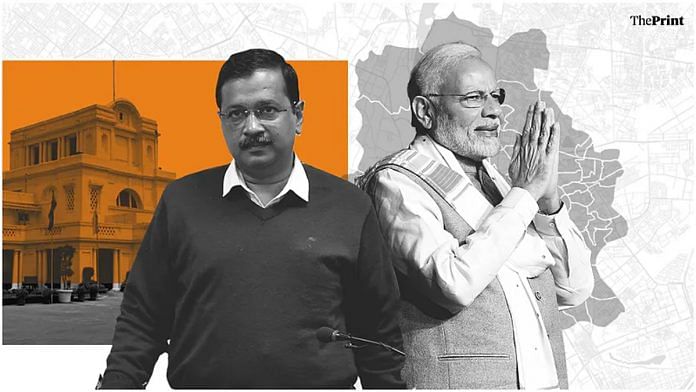Ek Tak Bhajapane — give an opportunity to the Bharatiya Janata Party — was the catchline of BJP Gujarat a couple of decades back. Although Gujarat embraced ‘anti-Congressism’ way back in the 1950s, Madhav Singh Solanki of Congress won 149 out of 182 seats in the 1985 assembly elections — a record that even Narendra Modi could not break with his rhetoric of Hindutva, asmita, and vikas. The phenomenal success of Solanki was largely credited to KHAM — a successful coalition of Kshatriya, Harijan, Adivasi, and Muslims.
Gujarat Congress’ fortunes went south soon due to the anti-reservation and communal riots in 1985. Then BJP started seeking ‘ek tak’ (one chance). After almost 25 years of BJP rule in Gujarat, now it’s Aam Aadmi Party (AAP) chief Arvind Kejriwal’s turn to ask for a chance à la BJP. “Ek moko Kejriwalne” is the slogan of the AAP in Gujarat.
A shrewd politician like Kejriwal can always bank upon Modi’s BJP for inspiration, especially when the momentum of assembly elections is building up in Gujarat. Much before Kejriwal took off with the anti-corruption plank, Modi projected his supposedly non-corrupt image aggressively and coined a Gujarati slogan: Khato nathi ne khava deto nathi, meaning he neither eats nor lets others eat. It was hardly the case, people working with various government departments in Gujarat would say. But the middle and aspiring classes were willing to ignore the reality when offered the heady mixture of communal agenda and ‘development’ with the anti-corruption cherry on top.
Modi as a CM wrote an open letter to Anna Hazare in support of the Lokpal Bill at the Centre, but he would not have one in Gujarat. Hailing Hazare suited both Modi and Kejriwal for their own political capital, though they must know now that an effective Lokpal Bill was a pipe dream easy to sell but difficult to implement and even harder to face.
Middle-class to VIP politics
Modi’s career in power politics took off with the 2002 communal violence in Gujarat. He continued his aggressive and defiant posturing for some years before adopting the agenda of vikas to move to the next orbit. Kejriwal played his angry, victim, middle-class, non-VIP image to the hilt. But he must have realised the long-term futility of such politics and tried to mould his new image as a leader who abandoned the politics of aggression. Modi’s strategy of bombarding voters with endless publicity and spending hordes of public money seems to have caught Kejriwal’s fancy too. Hence the full-page ads of the ‘achievements’ of the Delhi and Punjab AAP governments in Gujarati newspapers.
The cyber cell of the BJP must be another inspiration for Kejriwal. The AAP has got a very strong presence on social media. To be fair to the AAP cell, they don’t peddle lies and hatred constantly like the BJP handle does. But any criticism of the AAP usually meets with full force and the distinction between lies, half-truths, and distractions get blurred. A case in point: A photo of newly appointed Punjab CM Bhagwant Mann was posted on social media. It had B.R. Ambedkar and Bhagat Singh’s photo in the background. When people pointed fingers at the absence of M.K. Gandhi in those frames — in whose name the anti-corruption battle was fought — many AAP supporters took it very unkindly and showed their loyalty rather than common sense.
When it comes to Gandhi, Modi has no scruples in using his image and sanitised, tailor-made version of his teachings while acting in the opposite direction. Kejriwal, though, has kept an approachable yet safe distance from Gandhi. Any politician would know from the current scenario that Gandhi’s name and his efforts towards striking Hindu-Muslim unity might antagonise a sizeable number of voters who are already polarised.
Also read: Arvind Kejriwal isn’t a one-man army in Gujarat. Here are 3 new AAP poster boys
Picking leaf from Modi’s playbook
Modi was very vocal on several polarising issues in his earlier avatar. Later on, his acolytes took over, and he observed silence when he was expected to speak on pinching issues. Kejriwal seems to have adopted the same strategy with greater success. He does not take a stand on the issues like the 2019 Shaheen Bagh protests against the Citizenship (Amendment) Act and the 2020 East Delhi communal riots. This has made the AAP an “ideologically neutral” party. It appears like a sweet spot, but in the current times of complete polarisation, not taking a stand is also a stand if not outright opportunism.
When Modi became the chief minister of Gujarat, there were half-a-dozen contenders for the post. As time passed, the party started dumping many senior as well as junior front runners. And Modi replicated the same strategy successfully at the Centre. Kejriwal’s method is different, but his functioning style isn’t. When he became chief minister for the first time, he was surrounded by many well-meaning, competent persons. But as he progressed in his career, he managed to get rid of other worthies in the party. Now, it’s Kejriwal, and not AAP, seeking a chance in Gujarat, just like the BJP asks voters to vote for Modi.
It is no wonder that Kejriwal would take a leaf out of BJP’s election management. Although the AAP is yet to make page pramukhs, it is the high-tech, low-profile election management team that is completely separate and isolated from the political wing of the party — just like the BJP. The election spending is being channelled not through the political leaders but the strategist team.
Kejriwal has promised free electricity (up to 300 units per month), free education, unemployment allowance and more in Gujarat. You can sum it up as ‘achhe din’ if you wish.
Urvish Kothari is a senior columnist and writer based in Ahmedabad. He tweets @urvish2020. Views are personal.
(Edited by Humra Laeeq)



